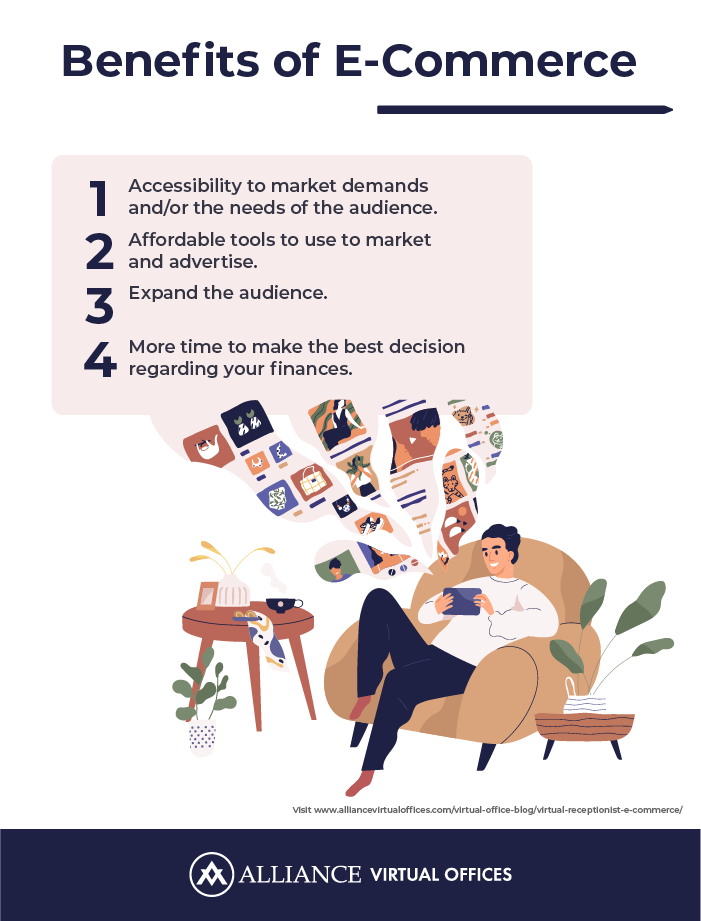- Why is e-commerce important for small business owners?
- Why do some small business owners struggle with e-commerce?
- How can you use e-commerce for your small business?
Q: What is e-commerce for small business?
A: E-commerce is any kind of selling your business does on the internet. Small businesses can use e-commerce to reach new markets and grow much faster than they would otherwise. This article explores e-commerce for small business.
Thanks to the rise of the internet and the creation of digital platforms, business owners have taken advantage of e-commerce.
While many people appreciate and sometimes prefer the traditional brick-and-mortar setups, an impressionable amount of people have optimized the opportunity to build a relationship with online shoppers and maximize internet commerce.
This optimization begins with understanding e-commerce.
What is E-Commerce?
Electric commerce (E-Commerce) has to do with the exchange of products and services over the digital network.
It gives you the opportunity to expand into digital waters (metaphorically speaking) and grow your business beyond what you can expect to achieve with a traditional brick-and-mortar store.
With e-commerce, you are able to tap into the data, research, and information necessary to connect with your audience and meet the needs of others through your business.
Utilizing e-commerce for your business provides you the chance to tap into markets previously inaccessible due to distance and geography, while reaching consumers in ways you can’t do in the physical world.
What are the Benefits of E-Commerce?
Multiple payment options
An e-commerce business allows customers to take advantage of the numerous payment options at hand. These options include debit card, cash on delivery, and many more. You also have the opportunity to receive notifications about cart recovery, which occurs when a customer puts an item in their cart and does not check out.
Accessibility to market demands and/or the needs of the audience.
With an e-commerce business, a customer is able to be notified of products that they want as well as restocking items commonly requested by their audience.
Affordable tools to use to market and advertise
E-commerce provides many tools for businesses to promote and market their business online. This can be done through tools like adding videos, images, and infographics centered around that business and the contents of it.
Expand the audience.
While your audience can expand from having a storefront, the reach potential expands once your business goes online. With e-commerce, you go beyond relationships with local buyers.
More time to make the best decision regarding your finances.
Consumers are no longer in a rush to purchase items and services when an e-commerce business comes into play. They have the opportunity to compare prices across a variety of websites and other platforms.
What Are the Types of E-Commerce Transactions?
There are three types of transactions that can occur: business to business, business to consumer, and consumer to consumer. Each of these transactions has to do with the exchange of commerce, products, or services between different parties.
B2B provides businesses with the tools to enhance or expand their business as well as the relationships with their clients through online directories and supply exchange networks. This also includes initiating transactions and thus gathering data from their clientele.
B2C focuses on the retail aspect of business across the internet. The focus is primarily on offering products, services and other forms of information to the consumer directly. This concept has been practiced in a more traditional, customer-facing setting like a store or marketplace.
Thanks to the growth of the internet, this commerce has been translated across the interweb, making it much more possible to create a profitable storefront without having to have such a physical presence.
One example of a site that is known well across the market is Amazon. According to CNBC, Amazon claims about 40% of the nation’s e-commerce sales. The article continues to discuss the company’s plans to expand into other ventures for its platform.
C2C focuses on the selling, trading or exchange of products, information, and services between consumers. Payments and other forms of transactions are handled through third-party platforms that join their e-commerce technology with the ever-changing economy.
Some examples of C2C businesses are companies like eBay and Craigslist. This market provides the space for consumers to implement commerce-producing strategies such as ads and auctions.
Why is E-Commerce Important for Small Business Owners?
E-commerce allows businesses of all different sizes to take advantage of an online selling network. The continued importance of this goes as follows:
- E-commerce provides an effective way to create orders online and make easier transactions for the customers.
- With e-commerce, there is no need for a middle man or rep to sell your products and services. You can do it all yourself in less time and half of the cost!
- You have the tools to further look into improving your customer acquisition, making it easier to know the needs of your customers before they even realize it.
- Your business is able to remain competitive amongst other companies with an online presence.
Why do Some Small Businesses Struggle with E-Commerce?
While e-commerce has become a necessity thanks to COVID – 19, there still may be struggles that small business owners may come into contact with along the way. Here are some of those struggles:
- It can be difficult navigating your online presence while maintaining a solid physical presence as well. Customer experience is important to navigate when incorporating e-commerce into your business. However, you may find yourself missing out on the physical interaction with your customers as well.
- Implementing e-commerce into your business is not an ‘easy fix’. Without the proper planning, research, and continuous assessment, you may find yourself declining when it comes to efficiency and productivity.
- Your competition changes, which is difficult in itself. Once you incorporate e-commerce into your business, you’re no longer competing with the same few companies. You may now find yourself competing with companies that have an established platform that is driven by e-commerce.
How Can You Use E-Commerce to Help Your Small Business?
Well, I’m glad you asked.
In tandem with this importance, e-commerce can help small businesses grow by taking these few steps:
You must make a business plan!
Much easier said than done, but very much possible in the exact right. Take the time to figure out what products or services you would like to offer, how to manage that inventory, shipping methods, and what payment options you will use.
Devise a plan on how to establish and manage your online presence.
Taking advantage of the proper web design, social media strategy, and even search engine optimization will allow you to reach out, establish and retain your audience (and incoming or returning customers).
Find a marketing strategy to use to increase profits at your business.
Understanding how to impress customers and increase revenue generation will be a game-changer for your business as it establishes your business with returning and new customers.
Without implementing active solutions to combat these struggles, small business owners will miss out on the potential of which their business may grow and profit.
A virtual receptionist has the tools and expertise needed to keep your business running smoothly. From emails to calls to clients, a virtual receptionist is able to free you up so you can tend to your business.
What does a virtual receptionist do?
A virtual receptionist is someone who answers phone calls, schedules appointments, and passes along helpful information to your callers. They can also be referred to as digital receptionists.
As simple as these tasks may seem, it can be a pain to juggle them in addition to the other managerial responsibilities that come with running an e-commerce business.
How does a virtual receptionist differ from an on-site receptionist or an answering service?
Answering services can handle incoming calls, but you risk losing the personal touch of an actual human tending to the needs of your clientele. That absence has been shown to affect the customer’s experience negatively.
In short, if you have the opportunity to focus on other tasks that are directly related to your business and can outsource the rest to others, it’s probably worth it. Considering the future of your business helps us understand why.
Outsourcing the administrative tasks for a virtual receptionist would allow you to use that additional time towards your specific business goals.
1. A virtual receptionist can improve your customer experience.
They provide empathy to customers and find issues for pre-existing problems. Another way to improve your business’s customer experience is by handling your CRM data.
Relationships are properly nurtured thanks to the input provided by your virtual receptionist. Using a CRM makes it easier for your business to increase customer retention and overall productivity.
2. They set up and organize appointment schedules.
It can be a hassle to keep up with your own schedule, much less managing your staff’s availability.
Virtual receptionists are versed in appointment setting and handling multiple calendars at a time. They keep up with no-shows and cancellations as they come, allowing you to move freely and productively throughout the day.
3. They offer availability beyond regular hours.
As an entrepreneur and business owner, it can be difficult to unplug during your time off because there may always be something to do, post, or handle.
Without a virtual receptionist, you may be held with the responsibility of tending to your own phone calls, emails, and other communicative correspondence well beyond work hours thus robbing you of any intended downtime.
Virtual receptionists offer support to your clients after hours by handling certain phone calls and presenting solutions to issues if applicable. Doing so strengthens the bond between your company and the clientele.
4. You finally have more time to dedicate to your business goals.
Because entrepreneurs find themselves wearing multiple hats within their business. It’s easy to find yourself shifting in so many different directions that you lack the energy to further your business goals.
With a virtual receptionist on staff, the burden of handling correspondences and appointments is off your shoulders. Doing so frees you up to handle more important tasks.
5. You’ll benefit way more from a virtual receptionist than an answering service.
While both handle the responsibility of answering calls, a virtual receptionist can transfer the calls to the intended person or persons and do an introduction if necessary. They create and nurture the all-important relationship between the client and your business.
6. Virtual receptionists can be adjusted to the needs of your business.
You can outsource based on how your business is performing. Digital receptionists can supply the administrative services necessary to contribute to the overall health of your business and its objectives.
Conclusion
While e-commerce is emerging as the go-to for commerce in businesses today, many small business owners have been looking for ways to manage day-to-day operations and integrate them into their business simultaneously.
It can be a hassle to multitask business objectives and administrative tasks.
Switching hats constantly can negatively affect the quality of your services and communications with customers. This can lead to burnout and other stress-related ailments.
There are healthy coping mechanisms that you can use to combat exhaustion. Doing so allows you to properly address the root of the stress and come up with a plan of action moving forward.
One way to minimize burnout from multitasking is by delegating responsibilities to other company members. Doing so frees up the owner’s availability to tend to more pressing tasks.
So let’s say you’ve done your research. You’ve learned about the role of a virtual receptionist and how they contribute to the success of your e-commerce business.
Further Reading
- Having Nightmares About Appointment Scheduling? It’s Time for a Virtual Receptionist
- How to Grow Your Business When You Hate Talking on the Phone
- Working from Home Increases Cyberattack Frequency by 238% | Alliance Virtual Offices
Are you ready to add a virtual receptionist to your e-commerce business but don’t know where to start?
At Alliance Virtual Offices, we have a live receptionist plan for business owners ready to put more time towards business objectives and less on such administrative tasks.
We provide affordable live receptionist plans that allow you to put your energy toward more pressing matters. Make sure that each pillar of your business is making a positive impact with a virtual receptionist from Alliance Virtual Offices.
What better way to increase efficiency and productivity than by letting trained professionals handle your incoming calls?










